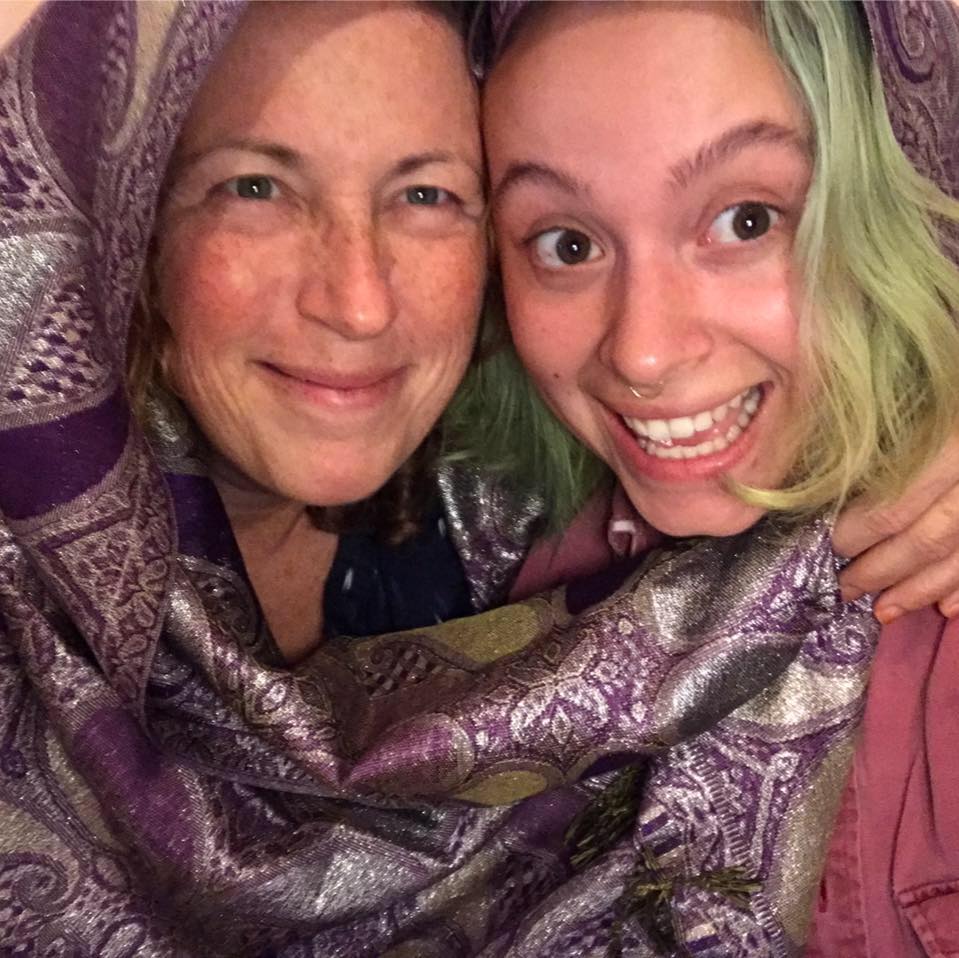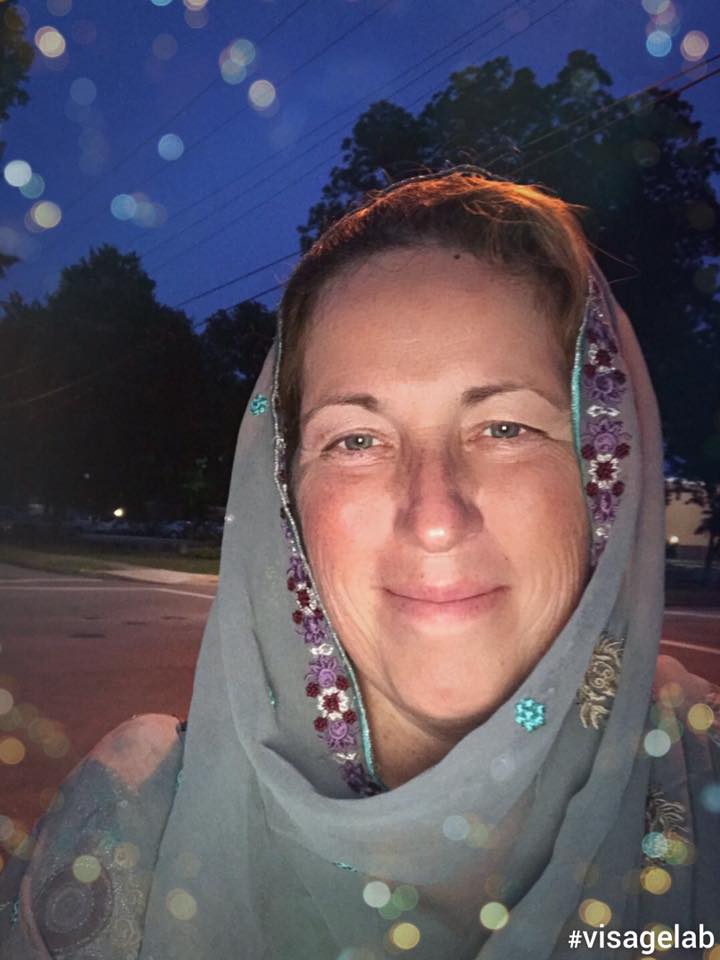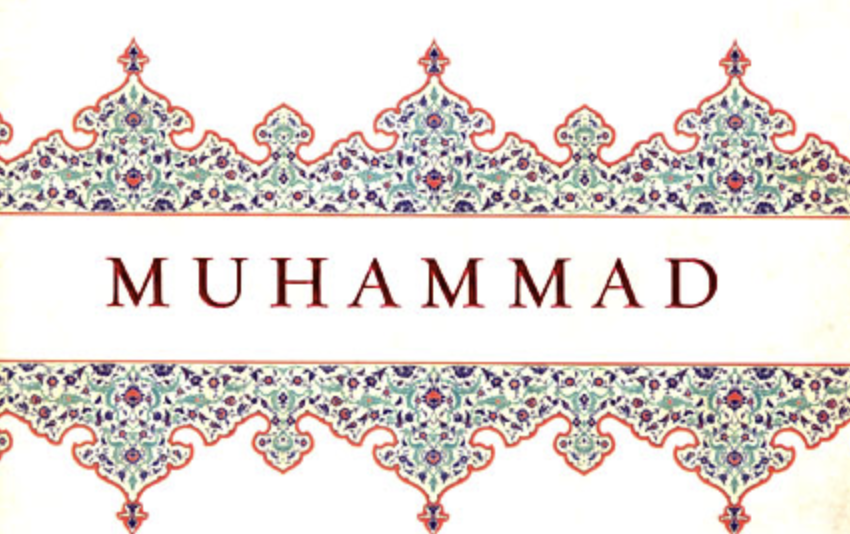As a white, American-born, new Muslim the hostile social pressure that’s constantly pelting me like rocks should be breaking me right now. Yet, the exhausting and ultimately, inspiring experience of my first Ramadan is acting as a shield, despite the challenges.
People keep asking me why, at the height of Islamophobia in America, I chose to become a Muslim. I sense that what they want to hear is that I was lured and brainwashed. I surprised myself when the answer that came out of my mouth was, “I was called.”
While I’d always had an unusual relationship with Christianity, I loved it with all my heart. My father was Jewish. My maiden name is Goldenthal. My mother is Roman Catholic.
I always felt connected to God. Church was a beautiful experience for me. The hymns moved me. I wept when I prayed. Some accuse me of “religion shopping” because I moved church homes to find community. It was still, always, Christianity.
Back in November, I accompanied my friend Stacey on a visit to the local mosque to show support for Muslims. I wore a scarf out of respect. This elicited jeers from some non-Muslims I know, “Why not just get a Burka and walk behind your man!”
Nobody ever offered me a Quran, or tried to recruit me to Islam. Frankly, people at the Mosque astutely sized me up as one of many shell-shocked voters seeking to self-medicate my anxieties over the new administration with a support visit to my Muslim neighbors.
Yet, sitting in a plastic chair on the linoleum floor watching the women on the rug pray, a feeling broke over me like a rogue wave that hits you, soaking you through, when all you had intended was to dip your toes in the ocean. It was startling, refreshing and awakening. I still don’t know why.
On my second visit I felt more of a pull, an undertow maybe, or perhaps it was a lifeline inside my chest that ran from somewhere behind my heart, directly to the corner of the room where a laminated plastic sign said Qibla (Mecca).
A new acquaintance (now a friend), Saher, motioned for me to come sit on the carpet with her. When the Rakaat (prayers) started she whispered, “Just follow.”
The moment my forehead first touched the carpet I was home. I felt it as surely as if a reboot button in me had been pressed and I reverted to my factory setting – Muslim.
For months, I kept going to the masjid (mosque) on Fridays and church on Sundays. However, I suddenly felt unplugged from Christianity. What once felt substantial, fulfilling, and real to me had become like a one-dimensional, Hollywood film set, seen from the back.
As time passed I felt awkward and wrong praying without my scarf. I felt overly conscious of my short skirt and my uncovered arms. When I invited members of my church to an outreach event at the mosque I was met with disdain. When I began helping refugees who settled in our area the majority of members of my church were unresponsive. I stopped going.
That’s how it happens that, at age 52, mother of five, I made my shahada in May.
Between two different apps on my phone, Step by Step Salah and Muslim Pro, five different translations of the Quran, YouTube and a host of amazing new friends, I am finding my way.
At home, being the only Muslim in the house makes Ramadan trying. I’ve tried to take the discomfort of my family into account and pray discreetly, but not secretly.
My wardrobe is both a sore trial to those who know me and a source of mirth for my new Islamic Ummah (family). Because I’m American, of Eastern European extraction, I don’t have a cultural frame of fashion reference for Islam. While I don’t want to culturally appropriate, I want to be culturally appropriate.

Lisa and her daughter Elizabeth under the scarf she gave me for Mother’s Day in solidarity with Lisa’s Shahada.
Women at the masjid have helped me out with some of their old clothes. Because Islam is so diverse the running joke is to see which culture I represent on any given Iftar. “Aaaah, she’s Pakistani,” goes the cry when I wear one of the Shalwar Kameez, or “Oooh, here’s our new Afghani,” when I don a black kaftan. If it’s comfortable, clean and modest, that’s my new culture, whether it comes from Pakistan, the Congo or Walmart.
The first week of Ramadan was overwhelmingly stressful. I felt like a boxer about to fall face first onto the canvas, punchy and addled. I was worried that I would slip and forget not to drink. The realization that thirst is more powerful than hunger still amazes me. While I miss food for 17 hours a day, it’s water, water, water I crave.
Iftar at the masjid makes every day worth the struggle. I know that no matter how unkind people are to me for my decisions there is a very large, welcoming family waiting for me.
By week two I had figured out a food strategy for suhoor and how to take a cat nap and not be a hangry zombie – mostly.
I still don’t have a cure for the dehydration foot cramps I get while standing during Tarawee prayers from 10 p.m. until midnight. By the second hour we all begin to sway almost imperceptibly, side to side, both from the intensity of the Quran recitation we hear and to keep muscles from locking up.
Because I can’t sleep immediately after eating suhoor at 3:30 a.m., I have taken to reading the 99 Names of Allah aloud, like counting the holiest of sheep.
Every day of Ramadan, as I refrain from food, drink, swearing and any one of a number of my former habits, I crave more of this experience.
Critics say I will fail at being Muslim. Every day of Ramadan I’m a newer, more educated, more resilient, Muslim. It is only for Allah to judge my failings and knowing that, the waves of taunting that knock me down fail to sweep me away.
Because my compass is set on Quibla, I’m no longer at sea in this world.
Lisa Suhay is a career journalist with 27 years experience and the mother of five. She is also the author of nine children’s books benefiting children’s charities. As a long-time community activist she is the founder of both RefugeeHelpers757 and the Norfolk Initiative for Chess Excellence (NICE) www.NiceChess.net.





There is a spectrum of beliefs in Christianity, Judaism, Islam, etc., from credible to moderate to extreme to true to false. Biblical, historical, orthodox Christianity (vs pseudo-Christian cults and nominal, liberal groups) is unique because Jesus alone is God in the flesh who proved HIs claims by the signature event of rising from the dead. Islam denies the Deity, death, resurrection of Christ putting it in the category of false religion and deception. Sincerity does not create truth and one can have a subjective experience in true and false religions (so rely on objective examination of history, founders, beliefs, practices).
All it was that you felt was in your mind and your perception. You went to a more traditional setting and it made you feel like you were important and in an important place. Had you went to a church that studied the Bible and you felt their passion, this would’ve happened to you there too. In my opinion you were never a saved Christian. I hope that God uses you as a way to get close to these people and snaps you back to the truth so that you can share what is real with them and then they become converted. It’s a far stretch, but with God, anything it possible!
Lisa. congratulations on your new beginning. i support your choice even if it is not a choice i plan to make. i hope you find peace and joy.